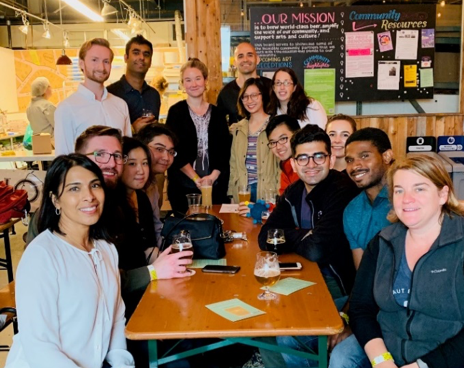
Building Communities through Science and Engineering.
by Leslie Chan, PhD
In recent years, the scientific community has shined a spotlight on the concept of convergence in science or “the merging of historically distinct disciplines” and its necessity to tackle big problems such as cancer. This year, my research provided numerous opportunities to converge with different groups of individuals—both new and old acquaintances—to collaborate, to educate, and to learn. Through these meetings, people and ideas were brought together and attests to the unifying impact of science.
Earlier this year, I travelled with my labmates across the country to San Diego for a retreat with our longstanding collaborators in the labs of Mike Sailor (UCSD), Erkki Ruoslahti (Sanford Burnham Prebys Medical Discovery Institute), and Ester Kwon (UCSD). The objective of the retreat is to foster collaborative relationships to promote the exchange of ideas. During the retreat, we presented our research, brainstormed ideas for new projects, swapped stories over meals, and completed an Escape-the-Room activity for team building. Over the years, trainees in our labs have co-authored over 20 papers together.
Group photo of the 2019 RBSK Retreat with the Ruoslahti, Bhatia, Sailor, and Kwon Labs in San Diego.
More recently, I participated in Science by the Pint, an event hosted by a local brewery during which members from a featured lab share their research with the interested public over drinks. I had a great time getting to know the attendees, many of whom were not in science and was just curious about our research.
(Top picture) The Bhatia Lab at Science by the Pint hosted by Aeronaut Brewery. (Bottom picture) Leslie having an impromptu brainstorming session with an audience member.
As a postdoctoral trainee working to transition to a principle investigator position, it is particularly important to me to understand best practices for leadership in the lab. Through the Convergence Scholars Program (CSP), I had the opportunity to attend the Cold Spring Harbor Laboratory Leadership in Bioscience Workshop to learn just that. Led by Drs. Carl and Suzanne Cohen, the workshop provided a structured format for learning key concepts for personnel management, negotiating, organizing productive meetings, hiring, goals setting and methods to provide useful feedback. At the workshop, I met many young investigators who had just started their labs. Over the course of the workshop, our cohort became a supportive network for those navigating the transition from postdoc to principle investigator.
Group photo of participants at the 2019 CSHL Leadership in Bioscience Workshop.
In addition to providing the opportunity for leadership development, CSP brought together a cohort of postdoctoral associates of different backgrounds with common motivations to explore topics beyond the bench. I am grateful to CSP for the people I have met and the experiences we have shared this year and look forward to more convergence in the years ahead!
Leslie is currently a faculty at Georgia Tech, and formally a postdoctoral associate in the Bhatia Lab where her research focused on the development of nanomaterials to enable breath tests for detecting and monitoring respiratory diseases such as acute respiratory infections and lung cancer. Leslie earned her B.S. in Biomedical Engineering from the Georgia Institute of Technology and her Ph.D. from the University of Washington under the guidance of Professor Suzie Pun. This year, she was awarded an NIH K99/R00 Pathway to Independence Award.




